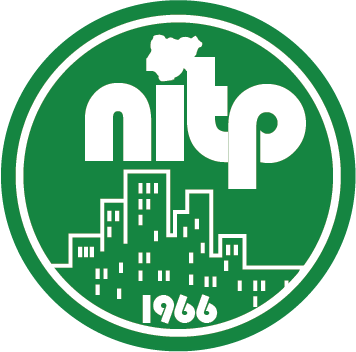WORLD ENVIRONMENT DAY 2023 – TOWARDS EVOLVING SOLUTIONS TO PLASTIC POLLUTION IN NIGERIA: URBAN PLANNING PERSPECTIVE

The Nigerian Institute of Town Planners joins the rest of the world in celebrating the World Environment Day for 2023. This takes place on the first Monday of June every year. It is a time to reflect on the environment which is the envelope within which the activities of humanity take place and the impact we exert on it. This year again, the issue of plastics is the focus of consideration. They seem to have become necessary evils which we must handle with diligence failing which irreparable loss and damage would be done to our environment. The National President of the Institute, Tpl. Nathaniel M. Atebije, FNITP therefore calls on all and sundry to act cautiously in the use of plastics to minimize the negative impacts on the environment.
Plastics are a wide range of natural, synthetic or semi-synthetic materials that use polymer as a main ingredient. Some of the most common polymers that are used every day include polyethylene or nylon threads. Between 1950 and 2018, plastics of about 6.3 billion tons were produced worldwide. Only 9% and 12% of these were recycled and incinerated while the rest were discarded in landfills and dumps (Richie and Max, 2022). Worldwide, approximately 500 billion plastic bags are used annually out of which an estimated 13 million tons ends up in the ocean, killing approximately 100,000 marine lives (Richie and Max 2022). It has been estimated that by 2050, oceans might contain more plastics than fish in terms of weight (Sutter, 2016). Globally, plastic contributed to greenhouse gases in the equivalent of a release of 850 million tons of carbon dioxide (CO2) to the atmosphere in 2019. These emissions could grow to 1.34 billion tons by 2030. By 2050, plastic could emit 56 billion tons of greenhouse gas emissions (CIEL, 2019). Residents in developing countries, especially the urban poor, are more severely impacted by plastic waste often through disposal in unregulated dumps or by burning. These practices create serious health, safety, and environmental consequences including respiratory issues due to air pollution from burning plastic; shortened animal lifespans arising from plastic consumption; clogging of drains triggering flooding and contamination of precious oceans and waterways.
In Nigeria, over 32 million tons of waste is generated annually with plastic accounting for 2.5 million tons (UNIDO, 2022). In the country, less than 12% of the wastes are recycled while about 80% ends up in landfills and unregulated dump sites (Richie and Max, 2022). Essentially, plastic bags have become major items in the litter system in Nigeria and have resulted in many detrimental environmental effects including animal choking, pollution, blockage of channels and rivers/streams and landscape disfigurement (Ujeh, 2021). Most cities in Nigeria are characterized by lack of resources, institutional organization and the capacity to provide basic infrastructure, which in turn have caused increased problems concerning management of solid waste. A lack of proper land use planning resulting in narrow streets that make it difficult for collection trucks to reach many areas of the cities has amplified this challenge. These factors largely explained why Nigeria released up to 0.34 million tonnes of plastic debris into the oceans in 2010 and was ranked the ninth country in the world for pollution of marine environments (Joseph, Odesola and Ayoola, 2020). Lagos, the commercial nerve center of Nigeria, alone produces between 13,000 and 15,000 tons of waste per day, including 2,250 tons of plastic (Akindele, 2022). It is therefore, apparent that the threat of plastic waste pollution in Nigeria is at an alarming state.
The most significant characteristics of plastic that increases its polluting tendency include the fact that it is not affected by acids and alkaline. It does not react with air, water and many other chemicals. It is therefore a non-biodegradable substance that is unsuitable as a material for landfills. It does not rust thereby remaining as a pollutant for a very long time. It is light-weighted making it easy to be carried from one place to another stress-free. Plastic is cheap and usually mass produced. It is water resistant. All these features enhance its widespread use. This coupled with its durability (non-biodegradability) and easy transportation tendency heightens its pollution capabilities.
There is no doubt that plastic waste generation rates are rising in Nigeria. Though, it provides multiple benefits to modern day living, its polluting effects on the natural environment including the ocean and other water bodies in the country are enormous. It is therefore paramount to manage it. However, any sustainable attempt to manage plastic waste must be guided by a well-articulated policy. Towards this end, the Nigerian Institute of Town Planners urges the government to develop a policy for recovery and management of plastic wastes. The overall objective of this policy is that there should be zero-waste disposal of plastic waste. Its fulcra shall include: institution of strategies for waste separation; legislation against illegal dumping of plastic materials; establishment of drop-off centers/boxes in all major cities; institution of return system involving exchange of plastic for money; provision of incentives including granting tax relief to any company who purposefully produces biodegradable packaging materials instead of plastic products and compelling commercial outfits to adopt biodegradable packaging materials. Others would include institution of levies and taxes on production of plastic bag; development of formal market for plastic waste recovery and establishment of formal linkage of scavengers with plastic waste generators.
To ensure seamless implementation of this policy, the Institute notes that the involvement of the informal sector partnerships is critical. This sector’s capacity must therefore be strengthened to increase plastic recycling. Community penetrative campaign to educate and motivate citizens to change their behavior towards plastic waste handling must be embarked upon. The use of garbage bins/dust bins at public places for disposal of plastic should be emphasized. Provision should be made for adequate collection and disposal systems. Throwing off plastic garbage in open spaces must be prohibited. Reusable shopping bags among consumers and corporate commercial outfits must be promoted. Avoidance of single-use plastics at household level must be avoided while plastic wares should be replaced by glass or steel containers. The need to transit to circular economy appears seemingly plausible for plastic waste management. This strategy hinges on recycling and reuse which is considered most appropriate for the non-biodegradable nature of plastic. In all of these, government willingness and ability to enforce this policy is imperative to achieving the goals of these focused interventions.
Managing plastic waste properly is essential for building sustainable and livable cities, but it remains a challenge in Nigeria. Taking action on plastic waste is something that all must be empowered to do - from citizens and governments to businesses and manufacturers. While the solutions may vary, increased awareness, and improved design and disposal processes, among others, are also critical to changing behavior and better management of plastic wastes. As a matter of urgency, the Federal Government of Nigeria is urged to flag-off upstream policy dialogues that will eventually lead to an implementable plastic waste management policy which will capture applicable and appropriate management strategies.
The Institute wishes the nation a successful celebration.


